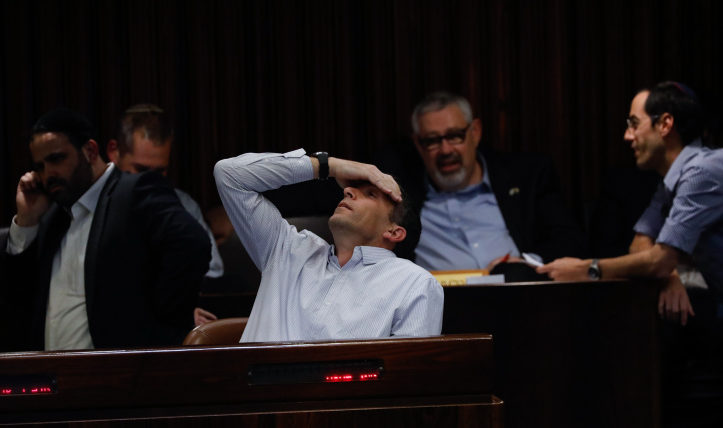Israel is faced with the unprecedented event of yet another round of elections.
By World Israel News Staff and AP
The gears of Israel’s political system continue to grind in place as the 22nd Knesset, serving for only three months, voted to dissolve itself at midnight Wednesday after a deadline passed to form a new government.
The Knesset, Israel’s parliament, passed a motion earlier to hold elections on March 2, hours after the deadline to form a coalition government expired. The motion passed with a 94-0 vote.
The public reaction has been described variously as shock, disappointment, numbness and disbelief.
“This nightmare, in which we’re heading into elections once again, the third within the space of a single year, is neither a parable nor a dream. It is completely real,” wrote Sima Kadmon in Yediot Ahronot , Israel’s second-largest daily.
“There aren’t words left that can express the public’s disgust with and mistrust towards its elected representatives,” he wrote.
No one admits to wanting a third election, though it may have been wished for secretly by the leaders of the two main parties, Prime Minister Benjamin Netanyahu and Blue and White leader Benny Gantz, if Avigdor Liberman of the Israel Beiteinu party is to be believed.
In a press conference on Wednesday, Liberman said, “The two big parties, which together have 65 mandates, carry the responsibility for the unnecessary elections. Aside from the battle of egos, that continues already for months – who’s first, who’s second, when will the rotation be – apart from this, also on the meaningful level, neither the Likud nor Blue and White wanted a unity government. The two of them preferred early elections.”
Israel now faces a nearly three-month-long campaign ahead of the vote that most polls predict will not produce dramatically different results that led to the current logjam.
As in each previous round, the largest parties, Likud and Blue and White, blamed each other for the impasse and tried setting the narrative for what is likely to be a grueling and caustic campaign.
“The politicians were unable to decide and so it goes back to the people. And it’s a shame. There weren’t big differences,” Foreign Minister Yisrael Katz, a Likud lawmaker, told Israeli Army Radio.
Israel has been mired in political deadlock for months, after two inconclusive elections and failed attempts by both Israeli Prime Minister Benjamin Netanyahu and his chief rival, former army chief Benny Gantz, to cobble together coalition governments.
During government negotiations, both sides professed eagerness to reach a power-sharing agreement, but could not agree on its composition nor who would lead it.
Netanyahu insisted on serving as prime minister, where he is best positioned to fight his recent indictment on a series of corruption charges. Gantz has refused to serve under a prime minister with such serious legal problems and called on Likud to choose a different leader.
Netanyahu faces charges of fraud and breach of trust in three corruption cases (and bribery in one) in which he is accused of trading legislative or regulatory favors in exchange for lavish gifts or favorable media coverage. Netanyahu denies wrongdoing.
Likud has seen a burgeoning insurrection by lawmaker Gideon Saar, who says the party needs a new leader because Netanyahu has been unable to form a government.
He appears to be gaining support and Israeli media reported on Thursday that Minister of Public Security, Strategic Affairs and Minister of Information Gilad Erdan, who has been loyal to Netanyahu, may support his candidacy.
Likud party primaries are set for later this month. Even with Erdan’s support, it’s unlikely that Sa’ar will win. Netanyahu’s popularity remains strong within the party, despite the corruption cases, which Likud members consider trumped-up and politically motivated.
Under Israeli law, a sitting prime minister charged with a crime is not required to step down. But ministers under indictment must resign and Netanyahu, who holds four portfolios, including health, agriculture and welfare, notified Israel’s Supreme Court on Thursday that he would give up each ministry by the New Year.
The letter to the court stressed that Netanyahu would continue serving as prime minister.
Netanyahu’s opponents argue he cannot guide the country through its myriad challenges while fighting his legal battles.


